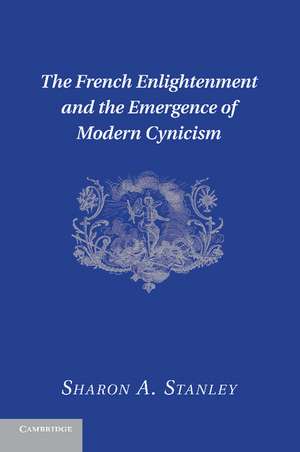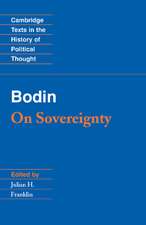The French Enlightenment and the Emergence of Modern Cynicism
Autor Sharon A. Stanleyen Limba Engleză Paperback – 5 mar 2014
| Toate formatele și edițiile | Preț | Express |
|---|---|---|
| Paperback (1) | 282.26 lei 6-8 săpt. | |
| Cambridge University Press – 5 mar 2014 | 282.26 lei 6-8 săpt. | |
| Hardback (1) | 716.38 lei 6-8 săpt. | |
| Cambridge University Press – 18 mar 2012 | 716.38 lei 6-8 săpt. |
Preț: 282.26 lei
Nou
Puncte Express: 423
Preț estimativ în valută:
54.01€ • 56.39$ • 44.70£
54.01€ • 56.39$ • 44.70£
Carte tipărită la comandă
Livrare economică 05-19 aprilie
Preluare comenzi: 021 569.72.76
Specificații
ISBN-13: 9781107639690
ISBN-10: 1107639697
Pagini: 236
Dimensiuni: 152 x 229 x 13 mm
Greutate: 0.32 kg
Editura: Cambridge University Press
Colecția Cambridge University Press
Locul publicării:New York, United States
ISBN-10: 1107639697
Pagini: 236
Dimensiuni: 152 x 229 x 13 mm
Greutate: 0.32 kg
Editura: Cambridge University Press
Colecția Cambridge University Press
Locul publicării:New York, United States
Cuprins
Introduction; Part I. The Enlightenment: 1. Enlightenment as disillusionment; 2. Unraveling natural Utopia; 3. The dark side of sociability; 4. The leveling power of commerce; 5. Hermits and cynics; Part II. The Present: 6. From Enlightenment to postmodernism; 7. Disenchanted democracy.
Recenzii
“When is the last time you heard someone say that what we need today is more cynicism? Starting with some of the best thinkers of the eighteenth century, such as Diderot and Rousseau, and showing how Rousseau got it wrong by becoming a moralist and Diderot got it right by remaining a cynic, Sharon Stanley explains how cynicism can actually benefit modern (or postmodern) democracy.” – John Christian Laursen, University of California, Riverside
“A wonderful rejoinder to the widespread lamentations about the alleged rise of cynicism and death of civil discourse. According to Stanley’s careful study, cynicism is not a ‘postmodern’ arrival, but a rich tradition with roots in the French Enlightenment. This book will change how you think about the opposition between modernity and postmodernity and the political value of cynicism itself.” – Jill Locke, Gustavus Adolphus College
“Though pundits may treat political cynicism as the result of some recent political or economic mishap, Stanley’s lucidly argued, very timely book traces the emergence of modern cynicism back to the writings of French philosophers such as Diderot and Rousseau. She argues that the Enlightenment philosophers’ ambivalent embrace of their era’s commercial and market-driven sociability helped cynicism to become an ineradicable feature of post-Enlightenment societies and their social forms. Rather than treating this constitutive ‘impurity’ in our interactions as a cause of despair, however, Stanley suggests that there are times in democratic politics when it is precisely the actions we might describe as cynical (i.e., opportunistic, disbelieving, or accommodating) that allow political action or change to occur in the first place. An engaging and thoughtful study, which should appeal to scholars specializing in French Enlightenment philosophy, eighteenth-century literary studies, and contemporary political theory.” – David Mazella, University of Houston
“A masterful examination of the intimate relationship between democracy and cynicism. Stanley offers a trenchant critique of alarmist cries about the death of democracy at the hands of cynicism and boldly argues that cynicism is not only endemic to modern democratic theory as it was developed in the eighteenth century, but is also crucial to the health of democracy today. Elegantly written, Stanley’s book also offers a delightful and provocative reevaluation of Diderot as the true figurehead of the Enlightenment and an author who might have more to say to us, today, than his more famous contemporaries Voltaire and Rousseau.” – Louisa Shea, The Ohio State University
“A wonderful rejoinder to the widespread lamentations about the alleged rise of cynicism and death of civil discourse. According to Stanley’s careful study, cynicism is not a ‘postmodern’ arrival, but a rich tradition with roots in the French Enlightenment. This book will change how you think about the opposition between modernity and postmodernity and the political value of cynicism itself.” – Jill Locke, Gustavus Adolphus College
“Though pundits may treat political cynicism as the result of some recent political or economic mishap, Stanley’s lucidly argued, very timely book traces the emergence of modern cynicism back to the writings of French philosophers such as Diderot and Rousseau. She argues that the Enlightenment philosophers’ ambivalent embrace of their era’s commercial and market-driven sociability helped cynicism to become an ineradicable feature of post-Enlightenment societies and their social forms. Rather than treating this constitutive ‘impurity’ in our interactions as a cause of despair, however, Stanley suggests that there are times in democratic politics when it is precisely the actions we might describe as cynical (i.e., opportunistic, disbelieving, or accommodating) that allow political action or change to occur in the first place. An engaging and thoughtful study, which should appeal to scholars specializing in French Enlightenment philosophy, eighteenth-century literary studies, and contemporary political theory.” – David Mazella, University of Houston
“A masterful examination of the intimate relationship between democracy and cynicism. Stanley offers a trenchant critique of alarmist cries about the death of democracy at the hands of cynicism and boldly argues that cynicism is not only endemic to modern democratic theory as it was developed in the eighteenth century, but is also crucial to the health of democracy today. Elegantly written, Stanley’s book also offers a delightful and provocative reevaluation of Diderot as the true figurehead of the Enlightenment and an author who might have more to say to us, today, than his more famous contemporaries Voltaire and Rousseau.” – Louisa Shea, The Ohio State University
Notă biografică
Descriere
Stanley argues that the French philosophes reveal the possibility of a democratically hospitable form of cynicism.


















